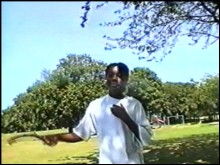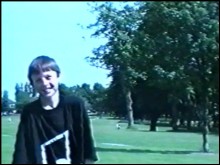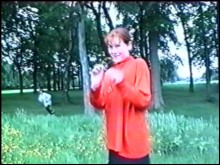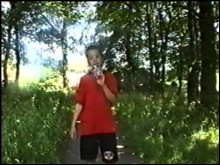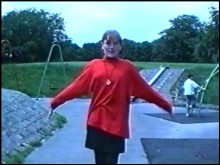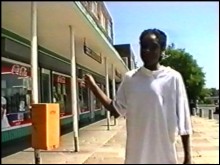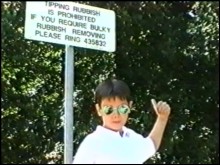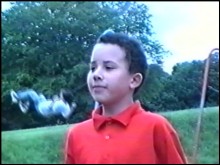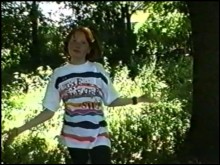Centre for Creative Media Research > Video Critical
Beckett Park Primary School: Making the video
|
|
This group, with some of the oldest children (year six - aged ten and eleven - as were those at Royal Park and Burley St. Matthias), were unlike any of the others in that they regularly called each other to account for anti-environmental behaviour, or hypocrisy, in an assertive or even aggressive manner. From the first week onwards, in characteristically lively discussion, they would frequently launch into vigorous argument with their groupmates regarding behaviour which contradicted their claimed views, or vice versa. For example, the hypocrisy of those in the group who complained of litter but also dropped it themselves, or who said they loved animals but were not vegetarian, was criticised in a manner which was not without humour, but was nevertheless robust. Entirely at the children's own instigation, their 'practice' video in the very first week became almost an impromptu court on behalf of the environment, with individuals hauled up to account for the difference between their stated beliefs and actual behaviour. For example, here Izoduwa was clearly finding Charlotte's responses unsatisfactory:
Soon more of the group joined in with each 'interview', and debate became even more heated, as in this extract from an extended session where Martyn was put on the spot:
The children were clearly not interested in having a 'cosy' debate, nor even in being particularly nice to each other. Whilst some of these arguments were, to a certain extent, banter amongst friends, those being grilled did appear somewhat uncomfortable, and environmental justice was - temporarily at least - seemingly put above respect for individual feelings. This is illustrated again in one further example:
The group were able to name a large number of environmental problems, and generally seemed to understand the more complex processes causing acid rain, and the depletion of the ozone layer. Their answers were perhaps the most sophisticated of all the groups; for example, they noted (with no prompting) that acid rain could in turn harm animals who eat affected plants, could kill fish and other life in rivers, and that the damage done to trees would be bad not only in itself, but also for the animals that live in them. Izoduwa, a Black girl noted for her articulacy, added the Third World to the list as a place with problems. Her sister had taught her African history, and she was familiar with the history of slavery. Izoduwa commented that Britain had left Africa poor, with and after the slave trade, and so should help the countries there now. Apart from one boy, Chris, the group said that they were bothered about such environmental problems, although a couple said that they were more honestly only concerned 'sometimes'. Chris's lack of concern seemed linked to his image (and self-image) as a disobedient male pupil, and indeed this was made explicit in this interview on video:
The direct connection between environmentalism and a concern for nature and others was clearly too much for Chris's notion of his own masculinity - being 'hard' - to allow. Nevertheless, as the completed video shows, even he could occasionally be heard to express appreciation of a clean environment. Summary Most of this group both started and finished the project with quite strong pro-environmental views, making any potential changes difficult to spot. However, the children seemed to enjoy having the opportunity to make links between their views and the local area, and to examine inconsistencies between their groupmates' professed beliefs and actual behaviour. The class teacher believed them to be a middle-ability group, albeit ones who might be expected to have something to say for themselves, one way or the other. She was consequently impressed by the quality of their video work, and indeed was surprised to hear of specific pupils doing particularly well - producing interesting arguments or novel ideas - when their written work was generally of a lower standard. The children's view of their local area did not seem to change substantially. In the first week it was said to be a mix of good and bad aspects, and the video made over subsequent weeks reinforced this thesis, although the group did rate the local park highly. The video project clearly got the children thinking, however, and challenging each other's behaviour in a surprisingly forceful but certainly pro-environmental way. |
![]()
The text and images on this site are by David Gauntlett, © 1997, 2004.
Back to > Video Critical home.

